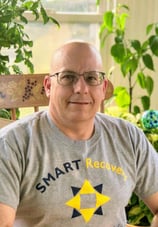
When a person goes to prison, they are given derogatory labels, considered dysfunctional, and somehow seen as “less than” others in society. Often, they are ignored by the outside world and basically put out of mind. And even though the vast majority of these individuals return to society, little is done to prepare them for the challenges they will face. If they are struggling with a substance-use disorder, this lack of preparation can contribute to negative behaviors continuing.
For SMART Regional Coordinator Chuck Novak, the use of labels is counterproductive (consistent with SMART’s strong stance), and the lack of attention and preparation just doesn’t make sense. Besides facilitating meetings for SMART, he works at Reentry Resource Counseling in New Hampshire, using SMART Recovery tools and principles to counsel those he calls “returning citizens” (rather than ex-offender or similar label).
Novak himself was once a returning citizen, having served five years for behavior that stemmed in part from his own addiction and negative choices. When he was released, he was certain of one thing.
“I knew I needed to do a different job; I knew selling drugs was going to be out…I wanted a new life.“
He started college and chose to pursue a path where he could help others, specifically those who had been incarcerated. While he himself was behind bars he heard about SMART in passing, it was mentioned in a book about Rational Recovery and Albert Ellis, the founder of Cognitive Behavioral Therapy (CBT).
It made enough of an impression to choose to do a research paper for a college class. He titled his paper “Get SMART” and it turns out he was the one who has ended up getting professionally and personally gotten by SMART since then. Now he incorporates CBT and many other tools in his work with individuals who are reentering society. He has a passion for making sure SMART is well known, and a unique name for his strategy.
“I implemented something I called operation bed bug, [deciding that] everybody who came into the detox where I was working in Manchester New Hampshire was going to get “infested” with SMART Recovery, so in the detox program they were going to learn [SMART tools like] the hierarchy of value, cost-benefit analysis, disputing irrational beliefs, and then they were going to go off into other rehabs and they were going to tell the counselors about SMART”

Besides his colorfully named initiative, Novak credits other powerful resources, such as SMART’s InsideOut: A SMART Recovery Correctional Program®. He notes that InsideOut contextualizes “criminal thinking errors” which are an extension of irrational thinking. This aligns with the Federal Bureau of Prisons’ perspective, making his work in drug courts well received.
“At Reentry Resource Counseling we coordinate and offer services for the Federal drug court of New Hampshire. So, I do individual counseling, and I do another cognitive behavioral group specifically for the drug court.“
Novak also notes the value of SMART’s Successful Life Skills because it covers things like budgeting, anger management and other practical matters–not just stopping substance misuse. As a probation officer put it to him, it’s great that they aren’t doing drugs, but they now have to learn how to do life.
Currently, Novak makes presentations about SMART as often as he can, stressing that success comes from keeping your goals and values in the forefront of your mind. In this way, Novak says, participants can not only discover life beyond addiction, they can fully engage in it. Just like he has done for 20 years and counting.
Help Us Reach More Returning Citizens in Need
As demonstrated in Chuck’s story, the ripple effect of impacting one life impacts others. It is because of individuals like Chuck, who experience SMART and then decide to use their time, energy, and resources to spread its self-empowering messages, that we are able to reach more and more people who need support.
Unfortunately, there are communities – and returning citizens– across the country who still desperately need increased access to free, self-empowering, science-based mutual help groups. We are working to meet that need.
Your year-end gift to our Growth Fund will be put to work immediately, to help more people like Chuck and the participants in his meetings find the self-empowering recovery tools and peer support they need to overcome addiction and go on to live fulfilling and meaningful lives.
Additional Resources:
- Chuck Novak podcast – Learning How to Do Life
- 25 in 25 Volunteer Spotlight
- SMART Courts & Corrections
- InsideOut: A SMART Recovery Correctional Program®
PLEASE NOTE BEFORE YOU COMMENT:
SMART Recovery welcomes comments on our blog posts—we enjoy hearing from you! In the interest of maintaining a respectful and safe community atmosphere, we ask that you adhere to the following guidelines when making or responding to others’ comments, regardless of your point of view. Thank you.
- Be kind in tone and intent.
- Be respectful in how you respond to opinions that are different than your own.
- Be brief and limit your comment to a maximum of 500 words.
- Be careful not to mention specific drug names.
- Be succinct in your descriptions, graphic details are not necessary.
- Be focused on the content of the blog post itself.
If you are interested in addiction recovery support, we encourage you to visit the SMART Recovery website.
IMPORTANT NOTE:
If you or someone you love is in great distress and considering self-harm, please call 911 for immediate help, or reach out to The National Suicide Prevention Hotline @ 800-273-8255, https://suicidepreventionlifeline.org/
We look forward to you joining the conversation!
*SMART Recovery reserves the right to not publish comments we consider outside our guidelines.*

